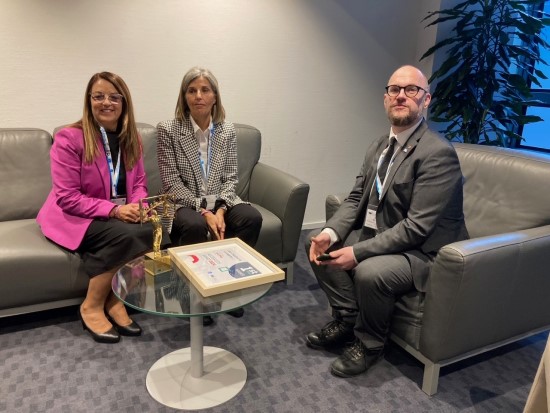A meeting between ACA winners
date: 12/12/2023

On the day of the Ceremony, Skellefteå, the 2023 ACA winner, met with this year’s winner, San Cristóbal de La Laguna and had a brief discussion. Skellefteå’s commitment to monitoring and evaluation to assess the impact of their accessibility initiatives and their overall strategic approach to accessibility led to their first prize win. Since then, Skellefteå has used the Access City Award financial prize to develop an interactive exhibition for children and young people to learn about living with different types of disabilities. To them, accessibility is important as “Accessibility for us means (…) to integrate the perspectives [of persons with different abilities] into all ongoing activities and projects in the city”.
We are handing over the title of Access City to you today. It was moving to see how emotional it was for you to realise you were the winners. How does it feel to win the 2024 Access City Award?
We felt incredibly nervous and excited. It is a great joy for a municipality like San Cristóbal de La Laguna and the welfare service to receive this award. Since 2019, we have been working on the accessibility of the historic centre of San Cristóbal de La Laguna. This award is giving us more motivation to keep moving forward so that persons with disabilities do not feel left behind. Rather, we are aiming to ensure that persons with and without disabilities in San Cristóbal de La Laguna have an accessible city and can navigate it easily. All our events have interpreters for deaf-blind persons and the Orange Point provides sensory backpacks so that people can feel the vibration of music through the backpack.
As mentioned before, we feel very emotional because we come from an island near Africa. Although we are a Spanish region, Europe feels very far away from us. When we heard we were among the five finalists, it was already very exciting. We never thought we would receive the first prize because we thought “These other European cities are closer to Europe”. Despite being the third-most populated municipality in the Canary Islands, we really did not expect it. It has been very moving and above all, receiving recognition for the work our tiny island does for persons with disabilities.
When we applied, our priority was to ensure that there was a strong monitoring and evaluation system to ensure our city became more accessible. What are your next steps to continue improving accessibility in your city?
Following on from a two-year consultation with organisations representing persons with disabilities, other municipal services, institutions of the Canarian government, councils, and transportation services, we developed a disability plan and are currently facing the challenges of implementing the services for the long-term. The plan has eleven axes ranging from education, culture, and sports to social welfare. What we want right now is to start taking small actions. One of the key things we want to start working on is to raise awareness in our broader population on all the barriers faced by persons with disabilities when they leave their homes. Unfortunately, many already face these barriers within their homes. We provide financial assistance to cover the removal of barriers such as having an accessible bathtub to a ramp and so on.
This year for the celebration of the International Day of Persons with Disabilities, we will be holding an open event in the Cathedral Square of San Cristóbal de La Laguna. We have arranged three types of exhibitions where people will be able to enter and see all the barriers that persons with disabilities encounter inside and outside their home. We believe that this activity will help us raise awareness on the challenges faced by persons with disabilities on a day-to-day basis.
In our eyes, accessibility means equal access to all of society for all citizens. To you what does making a city accessible mean and why should cities prioritize accessibility?
A city becomes more accessible when any person can enjoy it without encountering any physical, sensory, or psychological barriers when leaving their home. At the end of the day, having a disability should not be a 'handicap' for people. Regardless of whether someone is born with a disability or acquires one later on in life, they have the same rights as everyone else to enjoy their life in their city. The responsible parties to ensure this are public administrations, we are the ones that have to facilitate the removal of barriers present in cities.
